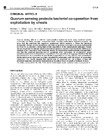Quorum sensing protects bacterial co-operation from exploitation by cheats
dc.contributor.author
Allen, Richard C.
dc.contributor.author
McNally, Luke
dc.contributor.author
Popat, Roman
dc.contributor.author
Brown, Sam P.
dc.date.accessioned
2023-06-30T10:33:12Z
dc.date.available
2017-06-11T23:34:57Z
dc.date.available
2023-06-30T10:33:12Z
dc.date.issued
2016-07
dc.identifier.issn
1751-7362
dc.identifier.issn
1751-7370
dc.identifier.other
10.1038/ismej.2015.232
en_US
dc.identifier.uri
http://hdl.handle.net/20.500.11850/111403
dc.identifier.doi
10.3929/ethz-b-000111403
dc.description.abstract
Quorum sensing (QS) is a cell–cell communication system found in many bacterial species, commonly controlling secreted co-operative traits, including extracellular digestive enzymes. We show that the canonical QS regulatory architecture allows bacteria to sense the genotypic composition of high-density populations, and limit co-operative investments to social environments enriched for co-operators. Using high-density populations of the opportunistic pathogen Pseudomonas aeruginosa we map per-capita signal and co-operative enzyme investment in the wild type as a function of the frequency of non-responder cheats. We demonstrate mathematically and experimentally that the observed response rule of ‘co-operate when surrounded by co-operators’ allows bacteria to match their investment in co-operation to the composition of the group, therefore allowing the maintenance of co-operation at lower levels of population structuring (that is, lower relatedness). Similar behavioural responses have been described in vertebrates under the banner of ‘generalised reciprocity'. Our results suggest that mechanisms of reciprocity are not confined to taxa with advanced cognition, and can be implemented at the cellular level via positive feedback circuits.
en_US
dc.format
application/pdf
en_US
dc.language.iso
en
en_US
dc.publisher
Nature
en_US
dc.rights.uri
http://creativecommons.org/licenses/by/4.0/
dc.subject
Microbial energy
en_US
dc.title
Quorum sensing protects bacterial co-operation from exploitation by cheats
en_US
dc.type
Journal Article
dc.rights.license
Creative Commons Attribution 4.0 International
dc.date.published
2016-01-08
ethz.journal.title
The ISME Journal
ethz.journal.volume
10
en_US
ethz.journal.issue
7
en_US
ethz.journal.abbreviated
ISME J
ethz.pages.start
1706
en_US
ethz.pages.end
1716
en_US
ethz.version.deposit
publishedVersion
en_US
ethz.identifier.nebis
005502685
ethz.publication.place
Basingstoke
en_US
ethz.publication.status
published
en_US
ethz.leitzahl
ETH Zürich::00002 - ETH Zürich::00012 - Lehre und Forschung::00007 - Departemente::02350 - Dep. Umweltsystemwissenschaften / Dep. of Environmental Systems Science::02720 - Institut für Integrative Biologie / Institute of Integrative Biology::09497 - Hall, Alex / Hall, Alex
en_US
ethz.leitzahl.certified
ETH Zürich::00002 - ETH Zürich::00012 - Lehre und Forschung::00007 - Departemente::02350 - Dep. Umweltsystemwissenschaften / Dep. of Environmental Systems Science::02720 - Institut für Integrative Biologie / Institute of Integrative Biology::09497 - Hall, Alex / Hall, Alex
ethz.date.deposited
2017-06-11T23:35:36Z
ethz.source
ECIT
ethz.identifier.importid
imp59365404b9ac116520
ethz.ecitpid
pub:172805
ethz.eth
no
en_US
ethz.availability
Open access
en_US
ethz.rosetta.installDate
2017-07-12T20:49:54Z
ethz.rosetta.lastUpdated
2024-02-03T00:55:11Z
ethz.rosetta.versionExported
true
ethz.COinS
ctx_ver=Z39.88-2004&rft_val_fmt=info:ofi/fmt:kev:mtx:journal&rft.atitle=Quorum%20sensing%20protects%20bacterial%20co-operation%20from%20exploitation%20by%20cheats&rft.jtitle=The%20ISME%20Journal&rft.date=2016-07&rft.volume=10&rft.issue=7&rft.spage=1706&rft.epage=1716&rft.issn=1751-7362&1751-7370&rft.au=Allen,%20Richard%20C.&McNally,%20Luke&Popat,%20Roman&Brown,%20Sam%20P.&rft.genre=article&rft_id=info:doi/10.1038/ismej.2015.232&
Files in this item
Publication type
-
Journal Article [128887]

